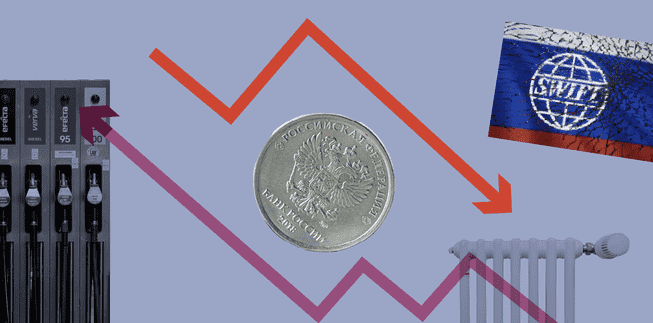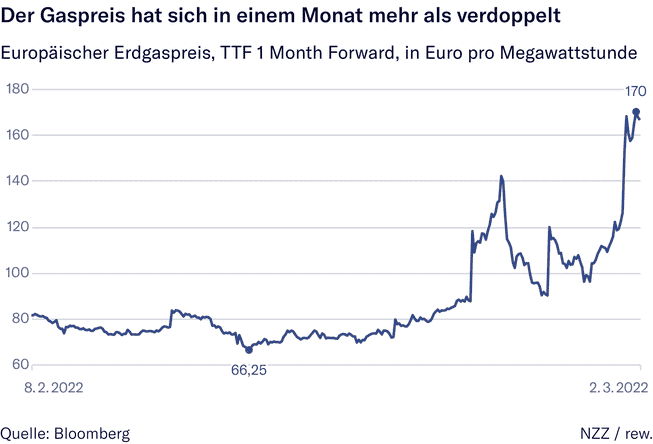«Means & Purpose» – Good money for a good life
Luke Sustala
You are reading an excerpt from the «Means & Purpose» newsletter. At «Mittel & Zweck» we want to put aside the very German tradition «you don’t talk about money» and talk to you about finances – and how you can shape your future with a good plan and the right tools. You can subscribe here. And here you can see what you’ve missed so far.
Today’s issue is about the consequences of the Ukraine war for the financial world and what it has to do with your money.
topic of the week
The war in Ukraine and its impact on finances

Russia brought war back to Europe – and that has many consequences. The correspondents of the NZZ classify the direct, the military and the foreign policy day by day, hour by hour.
But at the latest with what are probably the most severe economic sanctions that have ever been imposed on a country of the largest industrialized and emerging countries, the war also has enormous economic consequences.
Today’s issue is therefore intended to provide an overview of how and whether this confusing situation affects your finances.
1. Inflation follows invasion
Wars have always led to inflation in the past. The current one in Ukraine will lead directly to massive inflation, even if Germany does not take action. Oil and gas prices have risen significantly since the invasion, and those who haven’t recently invested in commodity funds in their portfolio will suffer the consequences of higher prices.
A barrel of Brent oil recently cost $115, up from less than $75 six months ago. A megawatt hour of natural gas currently costs 174 euros at the important hub in the Netherlands; half a year ago it was less than 35 euros. In addition, the price of wheat – for which Ukraine is an important export country – has already risen by more than 30 percent since the beginning of the war (Bloomberg). This will mean that fuel, heating and groceries will become even more expensive and the inflation rate will rise massively. Inflation was already 5.1 percent in February.

The rate of inflation now facing the population in Russia and Ukraine will be much higher. The Russian ruble has lost around a quarter of its value. The imports that are still coming to Russia despite sanctions have become much more expensive overnight, which will drive inflation to well over 20 percent in the short term.
2. Inflation protection is more urgent than ever
The inflationary pressure in Germany is definitely increasing. That means, as explained in our newsletter: prefer tangible assets to savings accounts. So save sustainably in shares, buy real estate instead of renting it, compare prices for current contracts – from mobile phone to gas providers.
3. Whole markets are now gone as an investment
If you have Russian stocks in your portfolio, you have a problem. The financial sanctions and the central bank’s decision not to let the Moscow stock exchange open (at least until Thursday) have led to a veritable sell-off. Gazprom or Russia’s Sberbank stocks traded in London have suddenly shrunk to penny stocks, i.e. stocks that can be bought for less than a dollar or a euro.
If you have invested in emerging markets via funds, it is quite likely that your fund company is also having a hard time getting rid of the Russian stocks or bonds. The index manufacturer MSCI, for example, is currently examining whether it will no longer hold Russian stocks in the stock indices of its emerging market or Eastern Europe products. The Russian market has become “uninvestable”, because of the sanctions you can’t really buy or sell (Reuters). As a result, the indices will probably be rebalanced soon, and Russian stocks such as those from Gazprom will not only disappear from Schalke’s suits, but also from many portfolios.
4. Suddenly “bad” stocks are in demand
A few weeks ago we were still dealing with green and sustainable investments. Since the beginning of the invasion, however, other stocks have been in demand. For example, shares in defense companies such as Rheinmetall are up 9 percent (as measured by the Stoxx 600 Aerospace and Defense Index) on the German government’s announcement that it will invest €100 billion in special funds in the Bundeswehr, while the market as a whole is slightly negative.
5. Be careful when chasing interest rates from politically unstable countries
Still recommended by Stiftung Warentest, but now broke: Sberbank has done a lot of advertising among savers in Germany in recent years and lured them with higher interest rates than normal. After all, 35,000 German savers have invested their money with the Austrian subsidiary of the Russian bank and now have to wait. Because the bank has stumbled and become solvent due to the sanctions, the Austrian deposit insurance must now pay for the German savings: Because savings deposits are protected by deposit insurance systems up to EUR 100,000.
However, the episode also shows that not only stocks but also savings accounts related to politically unstable countries can have their pitfalls. Then it is better to invest in a well-diversified stock portfolio for reasonable, long-term returns than to take a so-called cluster risk with savings accounts of foreign banks, which is highly political.
6. And what about Bitcoin?
From November, bitcoin was under considerable pressure in some cases. But suddenly the most important cryptocurrency became interesting again. Within a week, it went up almost 30 percent again to a price of just under 40,000 euros per Bitcoin. Because in view of financial sanctions against Russian banks and oligarchs, cryptocurrencies could be possible bypass constructions. And Ukraine also benefits from donations via cryptocurrencies. But beware: Bitcoin and other currencies could not only go up but also down under the spell of politics. If central banks and finance ministers suspect too much Russian activity, for example from oligarchs trying to keep their nests dry, they could massively tighten the regulatory screws for transactions in Bitcoin – to make sanctions more effective elsewhere.
7. Engage emotionally, invest soberly
Phases like the current one are not easy in many respects – and money is certainly not the focus for many right now. If you want to do something because the terrible situation and the many pictures and messages do not let go of you emotionally, then there are different ways to get involved or to help (for example via Unicef): support local charitable activities that help to provide for the hundreds of thousands of refugees, donate to aid organizations or simply be there for Ukrainian and Russian friends or colleagues to give them the feeling of not being alone in the difficult situation.
However, if you are dealing with your money during these times, you should proceed very soberly. Cost averaging can be practiced especially on days or weeks when there is a lot of volatility, i.e. things go up and down in the face of sanctions or war developments. For example, did you save with a large stock ETF? In such a volatile phase, make it your goal to make additional purchases automatically week after week in a disciplined manner. This is how you use lower entry prices for higher long-term returns, especially after corrections.
Here you can find more on the topic:
Thank you very much for your attention! If you have any questions or comments, feel free to reply to this email.
Good buy
Luke
